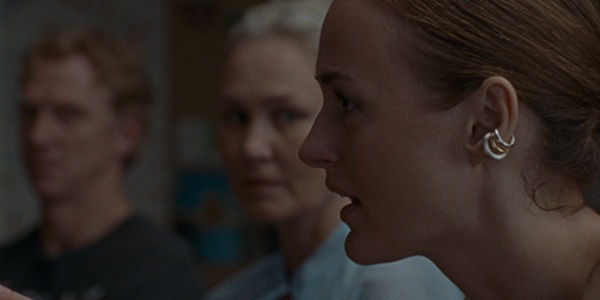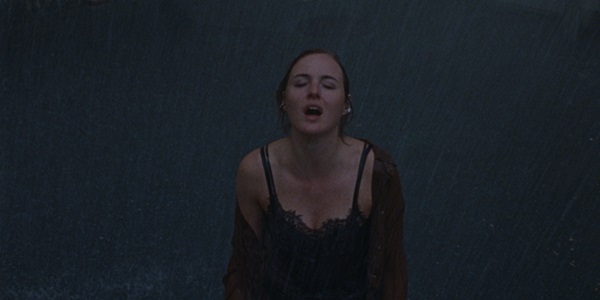ARMAND: The Performance of Truth

Lee Jutton has directed short films starring a killer toaster,…
Winner of the Caméra d’Or for Best First Feature Film at the 2024 Cannes Film Festival and Norway’s submission for Best International Film at this year’s Academy Awards, Armand has quite the cinematic pedigree. In addition to boasting the wonderful Renate Reinsve of The Worst Person in the World as both star and executive producer, it also happens to be the feature directorial debut of Halfdan Ullmann Tøndel, the grandson of Scandinavian cinema icons Liv Ullman and Ingmar Bergman. Yet while those names are more than enough to grab your attention, the film’s ability to hold it until the closing credits roll is another issue altogether.
He Said, She Said
The film unfolds after hours at a school where the parents of two six-year-old boys have been summoned to a crisis conference with staff. One boy, Jon, has accused another, Armand, of a violent outburst that may have also involved an act of “sexual deviation.” Jon’s parents, Sarah (Ellen Dorrit Petersen) and Anders (Endre Hellestveit) know Armand well: he is not only Jon’s friend but also his cousin, the son of Sarah’s deceased brother and his wife, Elisabeth (Reinsve), a well-known actress whose career is currently also in crisis. When Elisabeth arrives at the conference and is confronted by Sarah, Anders, and the boys’ earnest young teacher, Sunna (Thea Lambrechts Vaulen), she refuses to believe that Armand did such a thing—and if he did, why did no one notify her before the conference?

As the quartet of adults attempts to unravel the tangled web of allegations, other staff and parents are drawn in, and the whispered rumors about what may have happened grow in volume until they are loud enough to drown out any voices of reason. At the center of it all is Elisabeth—accused of being an irresponsible parent, of being so manipulative that she was responsible for her own husband’s death, of being the actual worst person in the world. But is she the villainous character that her sister-in-law and others make her out to be, or is she a victim herself? Is any one version of the story being repeated by these adults more true than the others, or are they all too twisted by their own biases to bear any resemblance to reality?
Digging Up Dirt
We never meet the titular character of Armand even though the plot technically revolves around him and what he may or may not have done. Instead, we spend our time with the parents and hear their versions of events once removed, with the automatic layer of distortion that this naturally entails. The film unfolds slowly and stressfully, gradually leaking out little bits of information about the characters and their relationships that radically alter all of your assumptions about who is at fault—if anyone is at all—over and over again.

The film’s action is almost entirely confined to the school, particularly the claustrophobic classroom where Sunna—well-meaning but out of her depth—attempts to mediate between Sarah, Anders, and Elisabeth. This makes Armand often feel more like a stage play than a film, a feeling that is only emphasized when Tøndel introduces surreal flights of fancy into the story in which Elisabeth expresses herself through interpretive dance and imagines herself being assaulted by the other parents at the school. While these hallucinatory moments break up what is otherwise a two-hour-long series of scenes of people talking and provide visual representations of Elisabeth’s fragile emotional state, they’re also unnecessary and distracting in the context of what is otherwise a very realistic and engaging story. Being forced to sit through these strange interludes of experimental theater makes it all too easy for the audience to run out of patience before the film finally winds its way to some kind of conclusion.
Nonetheless, it’s impossible to truly lose interest in Armand when Reinsve is on the screen. From the moment she first storms into the school—tall and intimidating in a long blood-red raincoat—you can’t take your eyes off of her or stop trying to figure out all of the complexities of her character. At one point during the conference, she dissolves into waves of uncomfortable laughter that go on for so long that you start to feel almost as panicky as Elisabeth clearly does; it’s the kind of tricky scene that would fail to have the appropriate effect on the audience in the hands of a less capable actress. Her primary scene partners—Petersen, Hellestveit, and especially Vaulen—meet her head-on and also give impressive performances.
Conclusion
Armand is at its best when it serves as a showcase for its quartet of talented lead actors, and at its worst when it tries to do anything more complicated than let them run the show
Armand had its limited theatrical release in the U.S. on February 7 and wide theatrical release on February 14, 2025.
Does content like this matter to you?
Become a Member and support film journalism. Unlock access to all of Film Inquiry`s great articles. Join a community of like-minded readers who are passionate about cinema - get access to our private members Network, give back to independent filmmakers, and more.
Lee Jutton has directed short films starring a killer toaster, a killer Christmas tree, and a not-killer leopard. Her writing has appeared in publications such as Film School Rejects, Bitch: A Feminist Response to Pop Culture, Bitch Flicks, TV Fanatic, and Just Press Play. When not watching, making, or writing about films, she can usually be found on Twitter obsessing over soccer, BTS, and her cat.













